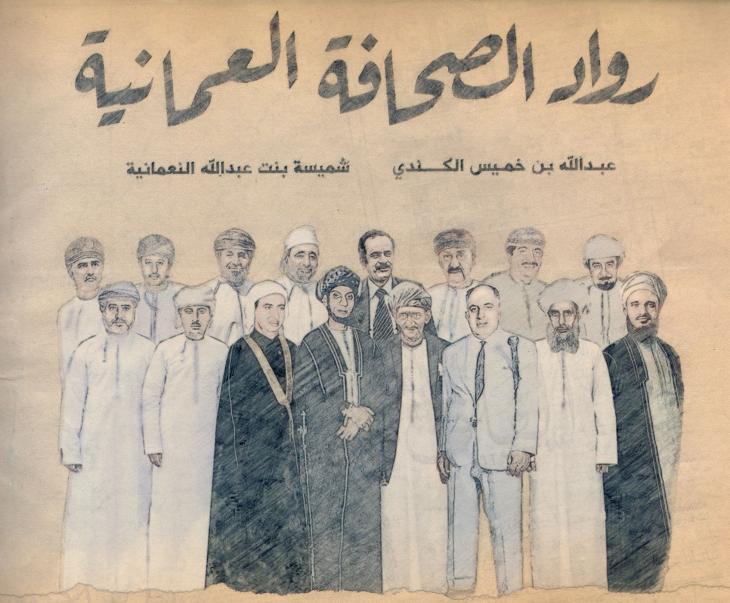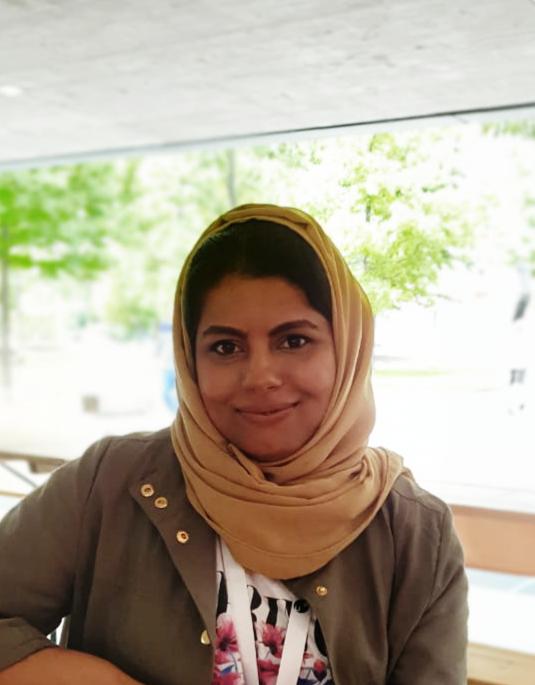يعد كتاب رواد الصحافة العُمانية للمؤلفين الدكتور عبدالله الكندي والباحثة شميسة النعمانية بناءا سرديا ومرئيا لتفاصيل هامة حول الصحافة في عمان مركزا على الشخصيات التي تولت قيادة المشاريع الصحفية العمانية في فترتين أساسيتين هما: الفترة الأولى من العام 1911 وحتى 1964 والتي أسماها الكتاب (صحافة المهجر في زنجبار)، والفترة الثانية التي تزامنت مع تولي السلطان قابوس الراحل مقاليد الحكم في البلاد العام 1970 وحتى يومنا هذا، وهو امتداد زمني طويل نسبيا يصل إلى ما يزيد عن المائة عام. هذا العمل الواقع في 300 صفحة مصقولة ومقدمة بشكل معبر يميل إلى الجانب التصويري الفني صدر عن دار رياض الريس في عمّان في العام 2020.
تأثرا بالثقافة والأدب أو انعتاقا حرا من السياسة ومنعطفاتها الشاقة أو تجاوزا لتلك التيارات التقليدية الاجتماعية أو حنيناً للوطن وانشغالا به تشكلت التجربة الصحفية العمانية، وأتى كتاب رواد الصحافة العمانية المصور ليلفت الاهتمام برحلة الصحافة المتمثلة في شخوصها المتعددة. تلكم الشخوص هي خارطة من المواقف والقصص والمبادرات والفرص والمنعطفات الحرجة التي أسست لتاريخ ممارسة الصحافة والنضال لأجلها في عمان في محطات جغرافية وزمانية متعددة.
عمر الصحافة بعمر شخصياتها
تقوم البنية البحثية للكتاب على تقديم الشخصيات الصحفية كمنطلقات رئيسية لتشكل الأحداث وتطورها بل وتطور الصحافة في عمان بشكل عام. ويرتبط هذا العرض بمحددات عدة بينها العمر الزمني للمشاريع الصحفية والصفة البارزة للنشاطات الصحفية ثم حديث متفاوت ووفق المتاح من المعلومات والأرشفة التاريخية المتوفرة عن مضامين الصحف والمجلات التي قدمتها تلك الشخصيات وأخيرا منعطفاتها الحادة التي أثرت على عمر الممارسة المهنية وثباتها عاما بعد عام.
يتحدث الكتاب عن هؤلاء الرواد جامعا إياهم في صورة بانورامية مصورة في غلافه ومقدما للقارئ العربي تصنيفه المنفرد الذي تستحقه كل شخصية؛ فناصر بن سالم البهلاني الرواحي مؤسس جريدة النجاح في العام 1911 هو إمام للشعر والصحافة في عمان، وهاشل بن راشد المسكري أبرز رؤساء تحرير جريدة الفلق في العام 1929 هو الصحفي التنويري، أما الشاعر والأديب عبدالله بن محمد الطائي وهو أحد أبرز رواد الإعلام في الخليج العام 1957 هو الصحفي الأديب. وهناك رائد الصحافة الأجنبية عيسى بن محمد الزدجالي مؤسس صحيفة TIMES OF OMAN في عام 1975، وصوت الصحافة الثقافية هو أحمد بن عبدالله الفلاحي مدير تحرير مجلة الغدير عام 1977، وغيرهم من الشخصيات الأخرى التي تناولها هذا الكتاب.
صحافة المهجر العماني: حدود الإنسان
يثير الكتاب بصورة ضمنية مسألة التاريخ الصحفي لعمان، وهو التاريخ الثقافي والإنساني بالضرورة إضافة لكونه العمل الوطني لهذا البلد في كل أحواله وتقلباته، فقد ظلت الصحافة كما يصفها الكتاب وفية وملتزمة بتقديم صورة الأحداث والوقائع في مختلف المحطات التاريخية. ويشير مؤلفا الكتاب إلى أن العمل التنويري للصحافة العمانية لازم العمانيين منذ مطلع القرن العشرين حينما هاجروا وطنهم الأم واستقروا في شرق أفريقيا، حيث يمكن اعتبار صحافتهم هناك صحافة للمهجر العماني نشطت بفعل انشغال المهاجر بوطنه الأم والبحث عن المناخات المشكلة لوعيه الخاص والجمعي في الوطن الجديد. وهذا ما يؤكده مؤلفا الكتاب عبر سبرهم للرحلة الصحفية العمانية في شرق أفريقيا من خلال روادها، حيث رصد الباحثان والمؤرخان جملة من الوقائع والشواهد التي تثبت أن شخوص وتكوينات تلك المرحلة الصحفية الهامة مثل أبو مسلم البهلاني الذي أصدر جريدة النجاح العام 1911 والجمعية العربية في زنجبار التي أصدرت جريدة الفلق العام 1929 وأحمد بن سيف الخروصي وعلي بن محسن البرواني اللذين أسسا جريدة المرشد العام 1929 وغيرهم من الشخصيات، قد استحضروا بلدهم الأم (عمان) عبر مقالاتهم وموضوعات صحفهم المنشورة آنذاك.
يحاول الكتاب عبر هذا الطرح تجاوز الجدل القائم منذ سنوات حول مدى اقتراب تلك الشخصيات ومشاريعها من البلد الأم (عُمان التي نعرفها اليوم) والوصف "الصعب" لصحافة زنجبار على أنها صحافة عمانية. ولهذا يؤكد مؤلفا الكتاب "على أهمية المسار التوثيقي لسير الشخوص لاسيما فيما يتصل بالصحافة العمانية المهاجرة أو للصحفيين الذين استغلوا فرصة بناء الدولة الحديثة التي أرساها السلطان قابوس بن سعيد في عام 1970 مطلقين أولى المحاولات لتشكيل صحافة عمانية في إطار الدولة العمانية الحديثة". بيد أن هذا التجاوز المنهجي لحدود عمان (الدولة الجديدة) التي خطتها أيادي الاستعمار البريطاني كما باقي دول المنطقة العربية لم يكن سطحيا وعابرا بل أنه أثر على الفهم اللاحق لحدود ثقافية وحضارية أخرى تتصل بهذا البلد وهي حدود عمان الإنسان والثقافة التي خطتها تجارب البشر ورحلاتهم وآمالهم بعيدا. أتى ذلك بعد سلسلة من البحوث والدراسات التي انطلق منها هذا العمل وأعمال أكاديمية وبحثية أخرى ورصد على إثرها تطور الشخصيات والوقائع المختلفة.
الجوانب الشخصية والاتجاه نحو العمل الصحفي
يركز الكتاب بصورة كبيرة على الجوانب الشخصية المحفزة للاتجاه نحو العمل الصحفي بناء على حضور ثلاثة معطيات أساسية: الأولى الموهبة والاهتمام الشخصي، والثانية العلاقات والروابط الاجتماعية والسياسية، والثالثة الانتماء الفكري والتيار وتأثير المجموعات التي ينتمون إليها. إن هذه المعطيات هي بمثابة بوصلة عامة للتطلعات المهنية والتي ستؤدي للدفع بهم لممارسة العمل الصحفي بل والاعتماد على الصحافة كمشروع أساسي للحياة والعمل والإنتاج والدافع المباشر للتغيير. وسنجد أنه في جميع الشخصيات التي تناولها الكتاب فإن هناك مرجعية معينة تقودنا لواحدة من الثلاث العناصر السابقة التي أسهمت في تشكيل المشروعات الصحفية بل وتطويرها والدفع بها للاستمرار. ومن النماذج الهامة على ذلك يذكر الكتاب مثلا أن الصحفي السياسي سعيد السمحان الكثيري الذي أسس مجلة العقيدة في العام 1972 قد استفاد بصورة كبيرة من ترشيح قبيلته له لمقابلة السلطان واستجاب بذكاء وحنكة عالية لرغبة السلطان الراحل قابوس بن سعيد في محاربة الشيوعية في تأسيس هذا المشروع الذي أريد له أن يحارب الشيوعية عبر التركيز على الإسلام. ومن النماذج الأخرى التاريخية في العام 1929، حينما منحت الجمعية العربية في زنجبار -التي كانت تؤدي أدوارا سياسية وثقافية بالغة الأهمية- الصحفي هاشل بن راشد المسكري الفرصة المواتية لإدارة مشروع صحيفة الفلق، ليتمكن الأخير من الانتقال بالمشروع لمراحل هامة عبر ترأسه لما يزيد من 12 عاما تمكن من خلالها من الالتفات للواقع الثقافي والسياسي والاجتماعي في زنجبار، وإبراز الهوية العربية، والاهتمام بقضايا الناس ومشكلاتهم.
في العام 1975 أسس الصحفي عيسى بن محمد الزدجالي صحيفة Times Of Oman. لقد أسهمت الكثير من الصفات الشخصية والمهارية التي امتلكها الزدجالي بينها عمله مع الجهات الخارجية وهو في داخل عمان، وقدرته على التحدث لأكثر من لغة بينها الإنجليزية والعربية والأوردية والبلوشية، وترحاله المستمر وعمله السابق في وزارة الخارجية مديرا للشؤون القنصلية من التعرف على الملامح الرئيسية لانطلاقة عمان نحو المستقبل (كما يصف ذلك الكتاب)، ولهذا السبب تولدت لديه حاجة ملحة لأن يصل صوت عمان للخارج عبر صحيفة عمانية يومية ناطقة باللغة الإنجليزية هي تايمز أوف عمان تهتم بالداخل والخارج على حد سواء.
ويمثل السفر والترحال إما للعمل أو الدراسة أو الاستقرار عاملا حاسما في تشكيل الهوية الذاتية للصحفيين بل وإمدادهم بالطاقة اللازمة لتكريس الصحافة في بلدهم. وسيجد القارئ للكتاب أن غالبية رواد الصحافة الذين قدمهم الكتاب استعاذوا بالصحافة بعد رحلة سفر طويلة، فلقد مكنهم السفر من التعمق في الحياة العصرية، وتعلم مهارات جديدة وخوض تجارب تستحق أن يعاد تكرارها في عمان. وعلى الرغم من أن تجربة السفر لم تكن مثالية لجميعهم بالطبع، فلقد حملت غربة ومشقة وضيق في المال والحال في بعض حالاتها؛ إلا أنها كانت دافعا مثاليا لصقلهم وإمدادهم بالقوة والجسارة لمواجهة التحديات القادمة.
تحديات وخيبات
يتلمس القارئ في هذا الكتاب مدى تأزم الحالة الصحفية وصعوبات ومشاق العمل صحفيا في مراحل مبكرة من عمرها في البلاد. على نحو متواتر، نرى كيف تمر الحياة بتحولاتها الصحفية على الصحفيين في مراحل حياتهم الأولى وإبان تأسيسهم للأعمال الصحفية أو في تراكم التضييق الذي يقود لخنق تلك المشاريع الصحفية الناجحة.
في رحلات اغتراب وابداع، يستحضر الكتاب تجربة رحلات عبدالله الطائي الأولى بحثا عن العمل ومساراته في ثلاثينات وحتى ستينيات القرن الماضي. تلك الحياة الشاقة بين باكستان والبحرين والكويت وبغداد لا تتوقف على مواجهة صعبة مع الأعباء الاقتصادية وضيق الحال والمال فحسب بل يمتد الأمر للعلاقة مع الأنظمة السائدة ومشاق تأسيس الأعمال الصحفية في ظل تكوينات إدارية لم تكن تمنح اعترافا بالصحافة. يهمني أيضا حتى أولئك الصحفيين الذين لا يزالون يواجهون أقسى الظروف بل وتكاد مشاريعهم الصحفية تندثر نهائيا وتختفي على الرغم من الاعتداد بهم كرموز حقيقية في الصحافة العمانية حسب الكتاب. أحد هذه الشخصيات الصحفي إبراهيم المعمري رئيس تحرير جريدة الزمن العمانية ومؤسسها منذ العام 2007، والتي أغلقتها السلطات العمانية نهائيا في العام 2017 بحكم من المحكمة العليا العمانية في حين واجه عدد من صحفييها تهما قضائية وسُجن المعمري على إثر تلك القضايا. صحيفة الزمن التي كانت "مغامرة شخصية" كما يصفها الكتاب قد أسسها المعمري بعد سنوات طويلة من غياب إصدار صحف جديدة في عمان، حملت أفكاره وتطلعاته للمشهد الصحفي العماني "قد قلبت صفحتها" كما يشير الكتاب وبكل خيبة وحزن سادت النقاشات عبر منصات التواصل الاجتماعي.
لماذا نستذكر تاريخ الشخصيات؟
لا يخلو الأمر من مجازفة، فتذكر الشخصيات يلزم المؤرخين والباحثين في تاريخ الصحافة بالتحقق من جميع المؤثرات المباشرة وغير المباشرة على مهنة الصحافة نفسها. وقد يبدو تذكر الأعمال الصحفية المميزة مثل التحقيقات التي نالت وصولها وتأثيرها في الفضاء العمومي هاما أيضا، أو لربما أن هناك قيمة في تتبع قصة نضال مؤسسة صحفية ما في شأن وطني عام وتلمس أثر تغطياتها في تغيير المسار السابق للأحداث. لكن في استذكار الشخصيات المبني على مزج عالمها الخاص بعالمها المهني وربط التفاصيل جميعا سيبدو عملية أكثر مشقة ولكنها أكثر جدوى لفهم الممارسة المهنية للصحفية في بلد ما من جهة، ثم لتتبع مستوى الجوانب الذاتية الخاصة بالصحفيين أنفسهم على مشاريعهم المهنية من جهة أخرى. بالنسبة لهذا الكتاب فإن "الصحفي" ليست كلمة مهنية مجردة، فالمهنة التي تعد واحدة من أصعب المهن عالميا هي تجسيد فعلي للإنسان، والمصالح، والمشاعر، والأولويات، وما يحيط بذلك من مؤثرات خارجية وهو ما ينبغي الاكتراث بشأنه أثناء تحليل أي ممارسة مهنية صحفية في بلد ما لاسيما في تلك البلدان التي يشق فيها على الصحفيين ممارسة مهنتهم.
خلاصة
إن تجربة العمل الصحفي تاريخيا لم تكن مثالية كما يرجوها ممارسي المهنة كما أن الصحافة في تلك الظروف لم تكن لتختفي وتندثر نهائيا ويختفي أثرها دون جدوى. لقد ظلت مسألة الصحافة في عمان كباقي بلدان المنطقة الخليجية والعربية بين مد وجزر متفاوتين وفق علاقة ارتهنت لعوالم السياسة والاقتصاد تارة وعوامل اجتماعية وتقنية ومعرفية تارة أخرى، وتشكل على إثر ذلك الرهان الصعب بشأن إنجاح الممارسة المهنية للصحافة عاما بعد عام.








































